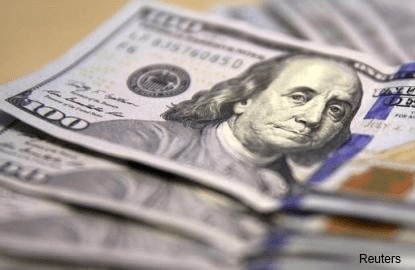
TOKYO (Feb 17): The US dollar wallowed near a one-week low against a basket of currencies on Friday after upbeat economic data failed to lift Treasury yields, with underlying concerns about US trade policy capping greenback attempts to bounce.
The dollar index against a group of major currencies stood flat at 100.470 after hitting 100.410 overnight, its lowest since Feb 9.
The index had soared to a one-month high of 101.760 as recently as Wednesday, as US Federal Reserve Chair Janet Yellen spoke in support of a near-term rate hike and the markets also saw robust US inflation and retails sales data.
Indicators released on Thursday shed more positive light on the US economy, with the Philadelphia manufacturing index on jumping to a 33-year high.
But the robust data was unable to sustain a rise in Treasury yields, which had already climbed to three-week highs mid-week, leaving the US dollar to buckle.
"The dollar did rally in spurts this week but the surge lacked strong conviction. For example dollar/yen failed to take out the 115.00 threshold," said Junichi Ishikawa, senior forex strategist at IG Securities in Tokyo.
"This shows that the market is still trying to work out the implication of President Trump's policies, of which his approach to trade may not be supportive for the dollar."
Furthermore, the troubles facing US President Donald Trump's administration, highlighted by the resignation of National Security Adviser Michael Flynn earlier this week, were also a source of investor concern.
The greenback was 0.1% higher at 113.340 yen after losing 0.8% overnight. It had briefly risen to a two-week peak of 114.955 on Wednesday.
"While Japan avoided being criticised for the yen at the recent summit, the fact that it remains vulnerable to scrutiny over currency levels has not changed," said Makoto Noji, senior strategist at SMBC Nikko Securities.
Currency issues were not high on the agenda during a two-day summit between President Trump and Japanese Prime Minister Shinzo Abe last weekend. The US President had recently lambasted trading partners for weakening their currencies to the disadvantage of the United States.
"The yen is still weak relatively speaking and fears that Japan could come under fire any time over currencies is limiting the dollar's advances against it," Noji said.
The euro was steady at US$1.0674 after climbing 0.7% the previous day. It was on track to eke out a 0.2% gain against the greenback this week, having been hit the previous week by perceived political risks to the euro zone.
Sterling extended modest overnight gains to rise 0.1% to US$1.2502.
The Australian dollar added 0.1% to US$0.7699. The Aussie was not far from a three-month peak of US$0.7732 set on Thursday on strong employment data.
The Aussie has gained steadily this year thanks to the draw of the country's relatively high yields and rise in the price of iron ore, the country's biggest export.
The New Zealand dollar was steady at US$0.7207. The kiwi was poised to end the week little changed after slipping to a 3½-week low on Tuesday after the Reserve Bank of New Zealand dashed expectations for a rate hike late in 2017.